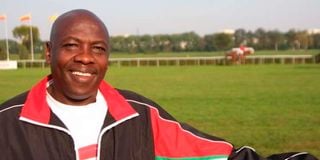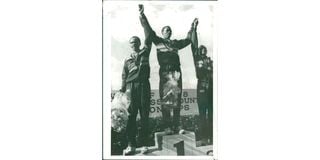Breaking News: At least 10 feared to have drowned in Makueni river
Day Ngugi’s thin frame nearly cost him successful career in athletics

The 1988 Seoul Olympics 5,000 metres champion John Ngugi.
What you need to know:
- Five-time world cross country champion once survived an attack by heard of buffaloes during training
When the history of Kenya’s sports heroes and heroines is written or rewritten, researchers will need to go deeper to get as much facts right as possible. These facts should include the good, the bad and the ugly that athletes go through in life to help current and future generations understand what to embrace, and what to avoid while climbing or going down the ladder of life.
Recently, I invited the 1988 Olympics 5000 metres champion John Ngugi, who is also a five-time world cross country champion, for a chat at Nation Centre in Nairobi, and having followed his spectacular performances locally and abroad, something struck me as being odd.
As the 60-year-old Ngugi approached the main entrance, I noticed that he was walking with a limp. Smiling broadly, we exchanged greetings as he patted my back, saying; “Sorry to have kept you waiting. I feel happy patting your back as it reminds me of the joy I get when President Uhuru Kenyatta pats mine telling me in Gikuyu ‘riika na nyumba itiumanagwo’ (agemates always stick together).
Both are close in age, and Ngugi still speaks highly of the President for his advice and understanding of people of all walks of life. The two have unfinished discussions that Ngugi hopes will be concluded before the President leaves office.

President Uhuru Kenyatta (right) meets with heroes and heroines during the celebrations of Kenya @50 at at State House, Nairobi on December 12, 2013. Pictured from left: David Okeyo, Kipchoge Keino, Tegla Loroupe and John Ngugi. President Uhuru later gave the group a flag to take to Mt. Kenya where Ngugi later took the flag to the then Nyeri Governor Nderitu Gachagua and both joined others to plant trees in Mt. Kenya.
Turning to his limping, Ngugi says, he developed a problem after an operation. He needs another operation if he is to walk properly.
Ngugi was born in Kigumo, Murang’a County, in 1962 but his parents migrated to Nyandarua County when he was a small boy and settled in Olkalou.
“My interest in sports started when I was a small boy. I used to watch soldiers and other adults train and compete at Nyahururu Stadium and told myself one day I will be like them,” Ngugi says of how he developed interest in sport.
He started running during community sports events at Nyahururu Stadium where a local coach, the late Stephen Mucheru noticed his talent and started coaching him.
“After winning a number of races, coach Mucheru decided to take me to Kahawa Garrison in Nairobi in 1981 to see if the military could offer me a job as a civilian. The gentleman in charge of the section we visited first told coach Mucheru that it was most likely that I had been infested with a lot of minyoo (worms) since I looked weak. He refused to take me in.”
Without any argument, coach Mucheru took Ngugi to another section under Sergeant Warrant Officer Two Ongoro. After the officer had critically looked at Ngugi from head to toe, he turned to coach Mucheru and told him; “The body weakness attributed to this young man is due to lack of enough food. Over and above the normal food that he will eat while here, I am ordering a daily intake of a packet of milk and a quarter kilogramme of meat.”
Says Ngugi with a smile: “Within a month after the additional packet of milk and a quarter kilogramme of meat daily, I became stronger and ran so fast nobody could catch up with me. The man who could not accept me in his section claiming I had worms was shocked and ashamed when he realised his mistake.”

A worthy example to emulate: John Ngugi (centre) raises the arm of compatriots Paul Kipkoech (right) and Kipsubai Koskei after the trio took the top three positions in the 1988 World Cross-Country Championships.
It did not take long for the military to officially recruit him. He was now a military officer – ready to serve with dignity. As an athlete of high repute, Ngugi would later become a household name both locally and abroad. But as he would come to learn with time, he had many encounters to face.
One morning, while training deep inside Ngong Forest near Jamhuri Park in Nairobi in 1986, Ngugi bumped into a herd of buffaloes. Two bulls from the herd attacked him. Behind him was a boxer whose name he could not remember. The boxer could not run as fast as Ngugi to escape, and the two furious bulls caught up with him. The boxer decided to lie flat on his stomach. He pretended to be dead, and for some reason, the buffaloes did not attack him while lying in that posture. Instead, they turned towards Ngugi who, however, managed to run away faster, leaving them several meters behind.
The boxer had an opportunity to save his life upon realizing that the buffaloes were now chasing Ngugi. They later returned safely to the training camp to narrate their story.
Ngugi went on to become one of the greatest athletes in the world, winning five World Cross Country Championships titles and an Olympic 5,000m gold medal during the 1988 Seoul Olympics in South Korea. While Paul Tergat had equalled Ngugi’s world cross country titles, he never won an Olympic gold (he settled for silver). To date, and 33 years down the line, no male Kenyan athlete has won an Olympic gold medal in 5,000m.

Lotto Chief Executive Officer Joan Mwaura (centre) with two five times World Cross Country champions John Ngugi (left) and Paul Tergat during Athletics Kenya 70th Anniversary celebrations at Nyayo National Stadium in Nairobi on December 15, 2020.
Ngugi has endured high level discrimination and victimization by some athletics officials as well as some athletes. During the 1987 World Cross Country Championships held in Poland where Ngugi was the defending champion, some Kenyan athletes threatened to boycott the championship, claiming that Ngugi had failed to qualify yet he was in the team.
One of the officials however defended Ngugi, telling the boycotting athletes that Ngugi was the defending champion and that alone made him eligible to compete. They reluctantly cooled down and he went on to successfully defend his title. What a shame!

President Daniel arap Moi (right) congratulates John Ngugi after the victorious Team Kenya for 1988 Seoul Olympic Games paid him a courtesy call at State House, Nairobi. Ngugi had won a gold medal in the 5,000m race and the excited President Moi ordered that Ngugi be given land in Nyandarua where he came from. He never got the land. The area DC did not invite Ngugi for land allocation as was the case.
While running for his fifth world cross country title at the 1992 World Cross Country Championships in Boston, Massachusetts, a Kenyan coach who did not want Ngugi to win (talk of tribalism) directed him to a wrong route, only for a white man to shout at the coach and showed Ngugi the route to take. Ngugi managed to sprint and caught up with the other Kenyan athlete and beat him to the finish line!
Says Ngugi: “We went out there to represent our country but some people had other motives. They failed”.
The most disturbing part of Ngugi’s athletics career is when he got a four-year ban for “alleged “refusal to undergo drug testing.”
Read the second part of this story on Monday




